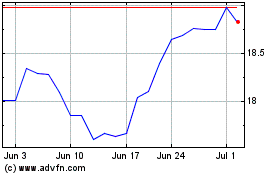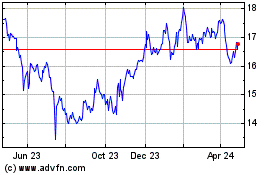Uncle Ben's Changes Brand Rooted in Racist Imagery. Now It's Ben's Original--Update
September 23 2020 - 12:41PM
Dow Jones News
By Annie Gasparro and Jennifer Maloney
Mars Inc. is changing the name of Uncle Ben's rice to Ben's
Original and dropping the image of a bow-tied Black man from its
packaging, the latest company to change branding rooted in racist
imagery.
Mars was one of a handful of food companies that said in June
that they would review or change branding on products including
Cream of Wheat, Mrs. Butterworth's and Eskimo Pie.
Changes to these supermarket staples come amid a national
reckoning over racism in the wake of the killings of George Floyd
and other Black people by police.
Other businesses also are rethinking products and imagery with
potentially racist connotations. AT&T Inc.'s WarnerMedia pulled
"Gone With the Wind" from its streaming platform for a time, Nascar
has banned the Confederate battle flag and the Dixie Chicks, the
platinum-selling country trio, dropped "Dixie" from their name.
PepsiCo Inc.'s Quaker Foods North America business has said it
is retiring the Aunt Jemima brand name and eliminating the imagery
of a smiling Black woman on its syrups and pancake mixes. The
company hasn't disclosed the new name but said packaging changes
would appear throughout the fourth quarter.
Mars said it surveyed thousands of consumers over the summer,
many of whom said the term "uncle" was pejorative and the image on
the brand's packaging, of a white-haired Black man in a black bow
tie, was reminiscent of servitude.
"Times have changed," Mars Food Global President Fiona Dawson
said in an interview. "Voices are being heard that weren't heard
before."
She said that Mars considered other new names but that Ben's
Original was the clear preference among focus groups and Mars
employees because it recognized the brand's decades of history
while moving it forward.
"Our consumers encouraged us not to lose Ben," she said.
Mars said the new logo for Ben's Original, with the familiar
blue font against an orange background, would appear online
immediately and on food packaging early next year.
The brand's origins reach back to 1937, when a Texas rice broker
named Gordon L. Harwell created a company to market a parboiled
rice he called Uncle Ben's Plantation Rice, according to "Food and
Drink in American History," an encyclopedia by historian Andrew F.
Smith. Mr. Harwell said he named it after a Black farmer in Houston
called Uncle Ben, who was known for his high-quality rice.
During World War II, Mr. Harwell formed a partnership with
businessman Forrest Mars to sell the rice to the U.S. Army.
Beginning after the war, Uncle Ben's Converted Rice was marketed
with the image of the man in the bow tie that remained on the label
until this week. That man was Frank Brown, a Chicago maitre d' whom
Mr. Harwell and Mr. Mars asked to pose for a portrait as the
brand's mascot.
The Uncle Ben's brand, like Aunt Jemima and Cream of Wheat, used
images perpetuating stereotypes of Black people in docile and
servile roles, according to "Aunt Jemima, Uncle Ben and Rastus:
Blacks in Advertising, Yesterday, Today and Tomorrow," by Marilyn
Kern-Foxworth.
The "uncle" honorific reflected a period when white Southerners
used those terms because they didn't want to address Black people
as "Mr." or "Mrs." Those three brands "have remained constant
reminders of the subservient positions to which Blacks have been
relegated over the years, " Ms. Kern-Foxworth writes in the
book.
Mars changed Uncle Ben's over the years to address complaints
that it perpetuated racist stereotypes. In 2007, the company
launched a marketing campaign that designated the fictitious Uncle
Ben as "chairman of the board." Some people said the marketing
effort didn't address the brand's racist connotations.
Mars said that at that time, surveys of consumers showed they
didn't take issue with the name or image. More recently, Ms. Dawson
said, consumer sentiment has shifted.
"The point of time that we're in now calls for more radical
change," Ms. Dawson said.
Write to Annie Gasparro at annie.gasparro@wsj.com and Jennifer
Maloney at jennifer.maloney@wsj.com
(END) Dow Jones Newswires
September 23, 2020 12:26 ET (16:26 GMT)
Copyright (c) 2020 Dow Jones & Company, Inc.
AT&T (NYSE:T)
Historical Stock Chart
From Mar 2024 to Apr 2024

AT&T (NYSE:T)
Historical Stock Chart
From Apr 2023 to Apr 2024
